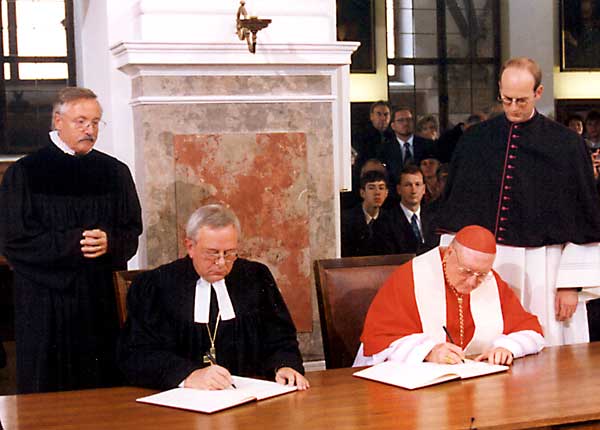A historic agreement

In October 1999, after years of committed dialogue, the Catholic Church's Pontifical Council for Promoting Christian Unity and the Lutheran World Federation signed a historic agreement, the Joint Declaration on the Doctrine of Justification (JDDJ). The agreement states that the churches now share 'a common understanding of our justification by God's grace through faith in Christ'.
Since the difference of opinion about justification was at the heart of the Reformation and the forming of breakaway Protestant churches, the joint declaration was a pivotal step towards bridging a 500-year-old division.
History of the Lutheran Church
Martin Luther and the Reformation
The Lutheran Church of Australia (LCA) understands itself to be a community of faith within the one holy catholic and apostolic church founded by Jesus Christ.
Along with all other Lutheran churches, the LCA traces its roots directly to a 16th century movement for renewal of the church known as the Reformation. Martin Luther was an Augustinian monk assigned to lecture in biblical theology at the University of Wittenberg in Germany. Even though he lived the life of a conscientious monk, Luther felt that he was not able to please God, but as he studied the Bible he began to realise that its central message is about God’s overwhelming love for us in Christ.
The Bible teaches that we are saved by God’s grace, through faith in Jesus Christ, and not by our own efforts to please God. And so Luther began protesting against church practices of that time which gave people the impression they must contribute to their salvation. Good works do not earn us salvation, Luther taught, rather, faith active in love is fruitful in a good life and good works.
Luther’s teaching, sermons, and writings inspired others to join him in working for reform of the church. Beginning at Wittenberg, evangelical reform spread to many areas of Northern Europe, especially in Germany and the Nordic countries. In 1530 Lutheran leaders were summoned to give an account of their faith before the parliament of the empire gathered at Augsburg.
The confession of Christian faith they presented to the emperor is known as the Augsburg Confession, and this has become the charter of Lutheran churches all around the world. As the movement for reform spread, other leaders came to the fore, and sadly divisions appeared among them. Those who followed Luther were nicknamed 'Lutherans'. Luther himself would have preferred them simply to be called 'Christians', but eventually the name was adopted. Today, around 74 million people call themselves 'Lutheran'. (See Lutherans Worldwide).
The spread of the Lutheran Church
After the Reformation, the Lutheran church went through times of internal dissension and was beset by external perils of various kinds, culminating in the horror of the Thirty Years War. In these years Lutheranism had to define and defend itself, and this is called the period of orthodoxy. Eventually, it was agreed that people should basically follow their leaders: if the duke is Catholic, his people should be too; if the prince is Lutheran, his people should follow him. Following this pattern, various regional churches developed in Germany, whereas in the Nordic sphere entire nations followed their rulers in becoming Lutheran.
When northern Europeans began to be involved in colonial expansion, those from a Lutheran background took their faith with them and over a period of time established new Lutheran churches. German and Nordic Lutherans settled in the new world of the Americas, and later in countries such as South Africa, Australia and New Zealand. A movement for renewal in the life of the church called pietism was the impetus for mission both at home and abroad. Lutheran missionaries took their evangelical faith to many parts of the world such as India, Asia, Africa, Madagascar, Indonesia and Papua New Guinea. Over a period of time, these missions grew up to become young independent Lutheran churches with indigenous leaders. The faith communities that grew out of the Lutheran movement are often called evangelical Lutheran churches. The word 'evangelical' shows that they are committed to preaching, teaching and living out the gospel of Christ.
In 1838 a group of devout Lutherans led by Pastor August Kavel left Germany because of persecution and settled in the new colony of South Australia. A month before their arrival Lutheran missionaries arrived at the same place to begin work among the Indigenous Australian people. These two events mark the beginning of the Lutheran story in Australia.

